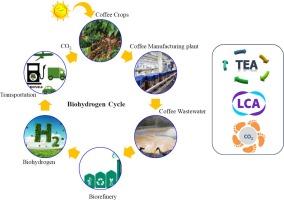在嗜热和中嗜热条件下,利用咖啡生产废水进行暗发酵制氢和厌氧消化的技术经济和生命周期分析。
IF 9.7
1区 环境科学与生态学
Q1 AGRICULTURAL ENGINEERING
引用次数: 0
摘要
研究了以咖啡生产废水(CW)为原料的嗜热暗黑发酵(TDF)和中嗜热暗黑发酵(MDF)与厌氧消化(AD)相结合的技术经济分析和生命周期评估。试点工厂设在伊朗,设计每天将 800 立方米的 CW 转化为氢气。嗜热条件下的氢气体积流量(立方米/小时)是中嗜热条件下的 1.1 倍;但两种条件下的氢气质量流量(千克/小时)大致相同(1.04)。MDF-AD 和 TDF-AD 工厂的制氢成本分别为 3.86 美元/千克和 3.84 美元/千克。MDF-AD 和 TDF-AD 设备的投资回收期分别为 1.3 年和 1.33 年。DF-AD 工厂整个系统的全球升温潜能值为 0.79 千克二氧化碳当量/千克氢气。尽管 DF 的制氢成本高于天然气制氢方法,但其环境优势支持了 DF 的商业化。本文章由计算机程序翻译,如有差异,请以英文原文为准。

Techno-economic and life-cycle analyses of dark fermentative hydrogen production integrated with anaerobic digestion from coffee-manufacturing wastewater under thermophilic and mesophilic conditions
Techno-economic analysis and life cycle assessment of thermophilic dark fermentation (TDF) and mesophilic dark fermentation (MDF) integrated with anaerobic digestion (AD) from coffee-manufacturing wastewater (CW) as feedstock were studied. The pilot plants were based in Iran and designed to convert 800 m3/day of CW into hydrogen. The hydrogen volume flow rate (m3/h) under thermophilic conditions was 1.1 times higher than that under mesophilic conditions; however, the hydrogen mass flow rate (kg/h) was approximately equal in both conditions (1.04). The hydrogen production costs for the MDF-AD and TDF-AD plants were 3.86 and 3.84 USD/kg, respectively. A payback period of 1.3 and 1.33 years for the MDF-AD and TDF-AD plants were obtained, respectively. The Global warming potential from the entire system was 0.79 kg CO2-eq/kg hydrogen for the DF-AD plants. The DF commercialization is supported by environmental advantages, despite its higher hydrogen cost than natural gas-based methods.
求助全文
通过发布文献求助,成功后即可免费获取论文全文。
去求助
来源期刊

Bioresource Technology
工程技术-能源与燃料
CiteScore
20.80
自引率
19.30%
发文量
2013
审稿时长
12 days
期刊介绍:
Bioresource Technology publishes original articles, review articles, case studies, and short communications covering the fundamentals, applications, and management of bioresource technology. The journal seeks to advance and disseminate knowledge across various areas related to biomass, biological waste treatment, bioenergy, biotransformations, bioresource systems analysis, and associated conversion or production technologies.
Topics include:
• Biofuels: liquid and gaseous biofuels production, modeling and economics
• Bioprocesses and bioproducts: biocatalysis and fermentations
• Biomass and feedstocks utilization: bioconversion of agro-industrial residues
• Environmental protection: biological waste treatment
• Thermochemical conversion of biomass: combustion, pyrolysis, gasification, catalysis.
 求助内容:
求助内容: 应助结果提醒方式:
应助结果提醒方式:


